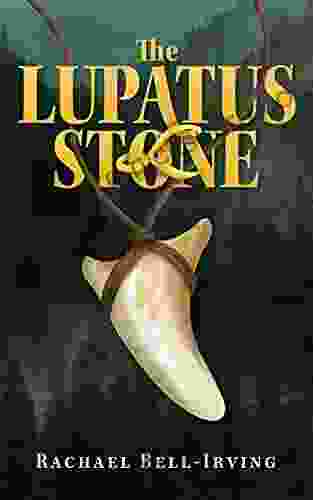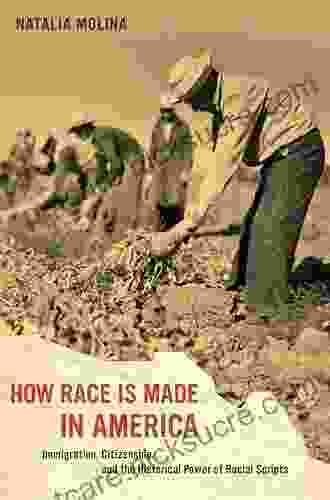Immigration, Citizenship, and the Historical Power of Racial Scripts in America

The United States has a long and complex history of immigration, and the experiences of immigrants and racialized groups have been profoundly shaped by the nation's racial scripts.
4.8 out of 5
| Language | : | English |
| File size | : | 3707 KB |
| Text-to-Speech | : | Enabled |
| Screen Reader | : | Supported |
| Enhanced typesetting | : | Enabled |
| Word Wise | : | Enabled |
| Print length | : | 228 pages |
| Lending | : | Enabled |
Racial scripts are shared cultural beliefs about the characteristics and behaviors of different racial groups, and they have a powerful influence on how people perceive and interact with each other.
In the United States, racial scripts have been used to justify the exclusion, discrimination, and oppression of immigrants and racialized groups.
For example, in the 19th century, Chinese immigrants were often depicted as "coolies" and "heathens," and they were subjected to a variety of discriminatory laws and policies, including the Chinese Exclusion Act of 1882.
In the 20th century, Mexican immigrants were often seen as "illegal aliens" and "criminals," and they faced discrimination in housing, employment, and education.
These racial scripts have had a lasting impact on the experiences of immigrants and racialized groups in the United States, and they continue to shape the nation's immigration and citizenship policies.
The Origins of Racial Scripts
Racial scripts are rooted in the history of colonialism and slavery, and they reflect the power relations between different racial groups.
In the United States, the concept of race was used to justify the enslavement of African Americans, and it continues to be used to justify discrimination against racialized groups.
Racial scripts are often based on stereotypes and generalizations, and they can be highly inaccurate and harmful.
For example, the stereotype of the "lazy Mexican" is based on the false belief that Mexican immigrants are inherently lazy, and it has been used to justify discrimination against Mexican immigrants in the workplace.
The Impact of Racial Scripts on Immigration
Racial scripts have a significant impact on immigration policy and the experiences of immigrants.
For example, the United States has a long history of restricting immigration from certain countries based on race, ethnicity, or religion.
In the 19th century, the United States passed a series of laws that restricted immigration from Asia, including the Chinese Exclusion Act of 1882.
In the 20th century, the United States passed a series of laws that restricted immigration from Mexico and other Latin American countries.
These laws were based on the racial scripts that depicted these immigrants as undesirable and dangerous.
The legacy of these racial scripts continues to shape immigration policy in the United States today.
For example, the Trump administration's travel ban on citizens from several Muslim-majority countries was based on the racial script that depicts Muslims as a threat to national security.
Racial scripts also impact the experiences of immigrants after they arrive in the United States.
For example, immigrants who are perceived as being from "undesirable" racial or ethnic groups are more likely to face discrimination in housing, employment, and education.
They are also more likely to be stopped by the police and deported.
The Power of Racial Scripts
Racial scripts are a powerful force in American society, and they have a profound impact on the experiences of immigrants and racialized groups.
These scripts can be used to justify discrimination, exclusion, and oppression, and they can have a lasting impact on the lives of individuals and communities.
It is important to challenge racial scripts and to work towards a more just and equitable society.
Challenging Racial Scripts
There are a number of ways to challenge racial scripts and to promote a more just and equitable society.
One important step is to educate ourselves about the history of racial scripts and the impact they have on our society.
We need to learn about the stereotypes and generalizations that are used to justify discrimination against racialized groups, and we need to challenge these stereotypes and generalizations.
We also need to work to build relationships with people from different racial and ethnic groups.
By getting to know people from different backgrounds, we can challenge our own stereotypes and assumptions, and we can learn to see people as individuals, not as members of a group.
Finally, we need to support organizations that are working to challenge racial scripts and to promote a more just and equitable society.
These organizations are working to change laws and policies that discriminate against racialized groups, and they are working to educate the public about the impact of racial scripts.
Racial scripts are a powerful force in American society, and they have a profound impact on the experiences of immigrants and racialized groups.
These scripts can be used to justify discrimination, exclusion, and oppression, and they can have a lasting impact on the lives of individuals and communities.
It is important to challenge racial scripts and to work towards a more just and equitable society.
By educating ourselves about the history of racial scripts, challenging stereotypes and generalizations, building relationships with people from different racial and ethnic groups, and supporting organizations that are working to challenge racial scripts, we can create a more just and equitable society for all.
4.8 out of 5
| Language | : | English |
| File size | : | 3707 KB |
| Text-to-Speech | : | Enabled |
| Screen Reader | : | Supported |
| Enhanced typesetting | : | Enabled |
| Word Wise | : | Enabled |
| Print length | : | 228 pages |
| Lending | : | Enabled |
Do you want to contribute by writing guest posts on this blog?
Please contact us and send us a resume of previous articles that you have written.
 Fiction
Fiction Non Fiction
Non Fiction Romance
Romance Mystery
Mystery Thriller
Thriller SciFi
SciFi Fantasy
Fantasy Horror
Horror Biography
Biography Selfhelp
Selfhelp Business
Business History
History Classics
Classics Poetry
Poetry Childrens
Childrens Young Adult
Young Adult Educational
Educational Cooking
Cooking Travel
Travel Lifestyle
Lifestyle Spirituality
Spirituality Health
Health Fitness
Fitness Technology
Technology Science
Science Arts
Arts Crafts
Crafts DIY
DIY Gardening
Gardening Petcare
Petcare Taylor Fontenot
Taylor Fontenot Gerd Gigerenzer
Gerd Gigerenzer Samuel Owedyk
Samuel Owedyk Lisa R Cohen
Lisa R Cohen Derald Wing Sue
Derald Wing Sue Lei Wang
Lei Wang Desiree Trattles
Desiree Trattles Philip Moore
Philip Moore Barry Ord Clarke
Barry Ord Clarke Linda L French
Linda L French Mark Miller
Mark Miller Zachary Willey
Zachary Willey Alan Greenfield
Alan Greenfield R J Vickers
R J Vickers M L Buchman
M L Buchman Maia Motley
Maia Motley Gerald Beaudry
Gerald Beaudry Clifford E Trafzer
Clifford E Trafzer Hana Ali
Hana Ali Janet Malcolm
Janet Malcolm Robyn Ryle
Robyn Ryle Cathy Hester Seckman
Cathy Hester Seckman Ewan Mcgregor
Ewan Mcgregor Valerie Nash Chang
Valerie Nash Chang Geoff Johns
Geoff Johns Karl Rehn
Karl Rehn Ben Rothenberg
Ben Rothenberg Robert Lanza
Robert Lanza Mike Chappell
Mike Chappell Eric Sevareid
Eric Sevareid Dan Robson
Dan Robson Arny Alberts
Arny Alberts Michelle Damiani
Michelle Damiani Dana Trentini
Dana Trentini Rafael Nadal
Rafael Nadal Patricia B Mcconnell
Patricia B Mcconnell Jon Young
Jon Young Lenora Chu
Lenora Chu David Barrett
David Barrett Erfun Geula
Erfun Geula Frank Wilczek
Frank Wilczek Jeremy Lent
Jeremy Lent Kim Mack Rosenberg
Kim Mack Rosenberg Shane Jones
Shane Jones Kaoru Sinozaki
Kaoru Sinozaki Gary E Schwartz
Gary E Schwartz Sharon Copeland
Sharon Copeland Philippa Langley
Philippa Langley Evelyn Raab
Evelyn Raab Jacob Stegenga
Jacob Stegenga Joshua G Shifrin
Joshua G Shifrin Jesse M Ehrenfeld
Jesse M Ehrenfeld David Weber
David Weber Skylar Kergil
Skylar Kergil Mike Lanza
Mike Lanza Brent E Turvey
Brent E Turvey Vaclav Smil
Vaclav Smil Julie Angus
Julie Angus Naomi Moriyama
Naomi Moriyama Bill Rodgers
Bill Rodgers Roger Frampton
Roger Frampton Leonie Mack
Leonie Mack R I Chalmers
R I Chalmers Duncan Hamilton
Duncan Hamilton Teddy Atlas
Teddy Atlas Intelligent
Intelligent Eryk Lewinson
Eryk Lewinson Kara Goucher
Kara Goucher Michael Archer
Michael Archer Emily Vikre
Emily Vikre Will Nett
Will Nett Traci Chee
Traci Chee Derek Rowntree
Derek Rowntree Jeanne Oliver
Jeanne Oliver Wendy Higgins
Wendy Higgins Christian Fader
Christian Fader Diane Vaughan
Diane Vaughan John Toussaint
John Toussaint Joshua Darwin
Joshua Darwin Randall M Packard
Randall M Packard Daniel H Pink
Daniel H Pink James M Tabor
James M Tabor Yaron Seidman
Yaron Seidman Raymond Arsenault
Raymond Arsenault Dk Publishing
Dk Publishing Florence Nightingale
Florence Nightingale Seth Tucker
Seth Tucker Six Sisters Stuff
Six Sisters Stuff Jody Morse
Jody Morse Harvey Penick
Harvey Penick Sarah A Clark
Sarah A Clark Keshia A Case
Keshia A Case Bradmd
Bradmd Daniel Todd Gilbert
Daniel Todd Gilbert Pam Vredevelt
Pam Vredevelt Scott Matthews
Scott Matthews Jonathan Tarbox
Jonathan Tarbox Kev Reynolds
Kev Reynolds Ian Stewart
Ian Stewart T M Mikita
T M Mikita Sarah Lawton
Sarah Lawton Saroo Brierley
Saroo Brierley Suzy Hopkins
Suzy Hopkins Robin Hobb
Robin Hobb Susan Ludington Hoe
Susan Ludington Hoe Tom Chivers
Tom Chivers Marva Collins
Marva Collins Ronald York
Ronald York Diane H Tracey
Diane H Tracey Monica Beyer
Monica Beyer Tim Deroche
Tim Deroche The Lodge Company
The Lodge Company Gail Buckland
Gail Buckland Maureen Dempsey
Maureen Dempsey House Of Talent
House Of Talent Andrea Sfiligoi
Andrea Sfiligoi Nathan D Lang Raad
Nathan D Lang Raad Robert Clifton Robinson
Robert Clifton Robinson Emily Chetkowski
Emily Chetkowski Nicole Zasowski
Nicole Zasowski Brad Myers
Brad Myers Michael Schiavone
Michael Schiavone Samantha Boardman
Samantha Boardman Pete Magill
Pete Magill Kay Kennedy
Kay Kennedy Jareth Tempest
Jareth Tempest Loudell F Snow
Loudell F Snow Diana Papaioannou
Diana Papaioannou Ann Jackson
Ann Jackson Brent Warner
Brent Warner Michael Clarke
Michael Clarke Jean Yves Leloup
Jean Yves Leloup Anthony Burgess
Anthony Burgess James Ragonnet
James Ragonnet Dinah Bucholz
Dinah Bucholz Otto Toeplitz
Otto Toeplitz Bill Douglas
Bill Douglas Laura Luther
Laura Luther Tillie Cole
Tillie Cole J F Tamayo
J F Tamayo Elizabeth Field
Elizabeth Field Latham Thomas
Latham Thomas Felicity Cloake
Felicity Cloake Ivor Horton
Ivor Horton Christopher Hook
Christopher Hook Heather A Smith
Heather A Smith Joanne Calderwood
Joanne Calderwood Keith Bowden
Keith Bowden Sally A Lipsky
Sally A Lipsky Kajal Gupta
Kajal Gupta William E Glassley
William E Glassley H Lee Jones
H Lee Jones Mara Rutherford
Mara Rutherford Nageshwar Sah
Nageshwar Sah 1st Ed 2017 Edition Kindle Edition
1st Ed 2017 Edition Kindle Edition Kiley Reid
Kiley Reid Susan Alcorn
Susan Alcorn Gary Dierking
Gary Dierking Lars Anderson
Lars Anderson Felicia Pizzonia
Felicia Pizzonia Ashlee Kasten
Ashlee Kasten Rosemary Ellen Guiley
Rosemary Ellen Guiley Jamie Dorobek
Jamie Dorobek Mindfulness Hypnosis Academy
Mindfulness Hypnosis Academy Laura Prepon
Laura Prepon Rachel Reed
Rachel Reed Kyler Shumway
Kyler Shumway Mae Ilami Onyekwum
Mae Ilami Onyekwum Karen L Cox
Karen L Cox Larry A Yff
Larry A Yff Harold Simmons
Harold Simmons Lori Bregman
Lori Bregman Launi Meili
Launi Meili Alison Pray
Alison Pray Liz Thomas
Liz Thomas Rebekah Dodson
Rebekah Dodson Megan Sloan
Megan Sloan Claire Dunn
Claire Dunn Jeffrey S Saltz
Jeffrey S Saltz Stephen R Lawhead
Stephen R Lawhead Jacob Gardner
Jacob Gardner Graham Priest
Graham Priest Janet Godwin
Janet Godwin Jamie Whyte
Jamie Whyte Jane Yeadon
Jane Yeadon Charles Fleming
Charles Fleming 1st Edition Kindle Edition
1st Edition Kindle Edition Nick Morrison
Nick Morrison Belinia Xenrale
Belinia Xenrale Alison Gopnik
Alison Gopnik Kathleen Buckstaff
Kathleen Buckstaff Natsuki Takaya
Natsuki Takaya Natalia Molina
Natalia Molina Francis L Macrina
Francis L Macrina Tim Powers
Tim Powers Hesam Nemounehkhah
Hesam Nemounehkhah Matthew Dworak
Matthew Dworak Matthew B Crawford
Matthew B Crawford 1st Ed 2018 Edition Kindle Edition
1st Ed 2018 Edition Kindle Edition Gill Stewart
Gill Stewart Helen Batten
Helen Batten Mike Bender
Mike Bender Andrew Evans
Andrew Evans Manjit Kumar
Manjit Kumar David Wolff
David Wolff Mark Lattanzi
Mark Lattanzi Piotr Naskrecki
Piotr Naskrecki Jacob Cohen
Jacob Cohen Lynne Tolley
Lynne Tolley Ray Mcnulty
Ray Mcnulty Robyn Perry Worthington
Robyn Perry Worthington Joshua James
Joshua James Grace Liu
Grace Liu Ali Psiuk
Ali Psiuk Shalini Shankar
Shalini Shankar Jacqueline Carey
Jacqueline Carey Editions La Plume D Eros
Editions La Plume D Eros Leonard Sax
Leonard Sax David Clark
David Clark Holly Hook
Holly Hook Estelle Maskame
Estelle Maskame Tyler Lansford
Tyler Lansford Irina Szmelskyj
Irina Szmelskyj Deborah Spungen
Deborah Spungen Philip Coppens
Philip Coppens Paul Annacone
Paul Annacone Chris Parsons
Chris Parsons Jim Baggott
Jim Baggott Irene Spencer
Irene Spencer Taran Matharu
Taran Matharu Andrew Solomon
Andrew Solomon Robert Lomas
Robert Lomas Monte Burch
Monte Burch Chris Stringer
Chris Stringer Sharon Wilkins
Sharon Wilkins Wabun Wind
Wabun Wind Chip Ingram
Chip Ingram Anne Polli
Anne Polli Joseph Mercola
Joseph Mercola Amanda Kingloff
Amanda Kingloff Evy Poumpouras
Evy Poumpouras Livy
Livy Jay Carter
Jay Carter Gary M Schultheis
Gary M Schultheis Stephen Bodio
Stephen Bodio Day Schildkret
Day Schildkret D James Benton
D James Benton 1st Ed 2020 Edition Kindle Edition
1st Ed 2020 Edition Kindle Edition Mark Vee John
Mark Vee John Judith Warner
Judith Warner Karen Kovacs
Karen Kovacs Joachim Rossberg
Joachim Rossberg Clark A Campbell
Clark A Campbell Helen Garabedian
Helen Garabedian John L Havlin
John L Havlin Nancy B Rapoport
Nancy B Rapoport Teri Tom
Teri Tom Craig Clapper
Craig Clapper Robert Chu
Robert Chu Mildred Council
Mildred Council Kim Dwinell
Kim Dwinell Katie Singer
Katie Singer 1st Ed 2021 Edition Kindle Edition
1st Ed 2021 Edition Kindle Edition Alexandra Kenin
Alexandra Kenin Glenda Green
Glenda Green Elizabeth Heavey
Elizabeth Heavey Paul A Laviolette
Paul A Laviolette Marisa Kanter
Marisa Kanter Ron Larson
Ron Larson Matthew Harffy
Matthew Harffy Daisaku Ikeda
Daisaku Ikeda Caroline Fidanza
Caroline Fidanza Chris J Ellis
Chris J Ellis Steve Crawford
Steve Crawford Christopher Carter
Christopher Carter Rick Barba
Rick Barba Pam Jarvis
Pam Jarvis Daniel Scott
Daniel Scott Lh Press
Lh Press Peter Heller
Peter Heller Alexandra Witze
Alexandra Witze Denis Dwyer
Denis Dwyer Isa Herrera
Isa Herrera Ric Conrad
Ric Conrad Sean Fitz Gerald
Sean Fitz Gerald Nancy Hendrickson
Nancy Hendrickson Berkshire K Greene
Berkshire K Greene Xiufeng Liu
Xiufeng Liu Christine E Sleeter
Christine E Sleeter Deborah T Goldberg
Deborah T Goldberg Leona S Aiken
Leona S Aiken Carola Hein
Carola Hein Burt L Standish
Burt L Standish Hannu Rajaniemi
Hannu Rajaniemi Alan Agresti
Alan Agresti Rana Conway
Rana Conway Geoff Powter
Geoff Powter Lech A Grzelak
Lech A Grzelak Bryn Huntpalmer
Bryn Huntpalmer Alan Naldrett
Alan Naldrett Tadahiko Mizuno
Tadahiko Mizuno Michele Smith
Michele Smith Carol Lynn Mckibben
Carol Lynn Mckibben Phyllis Franklin
Phyllis Franklin Jack Newfield
Jack Newfield John Vigor
John Vigor Arden Rose
Arden Rose George Grimm
George Grimm Ashley Stanford
Ashley Stanford Carol Matsuzaki
Carol Matsuzaki Amita Jassi
Amita Jassi Neil Sagebiel
Neil Sagebiel 1st Ed 2019 Edition Kindle Edition
1st Ed 2019 Edition Kindle Edition Elaine Heney
Elaine Heney S K Gupta
S K Gupta Wolfgang Jank
Wolfgang Jank David Fine
David Fine John T Cacioppo
John T Cacioppo Raven Morgaine
Raven Morgaine Alice Waters
Alice Waters Knowledge Tree
Knowledge Tree Asti Hustvedt
Asti Hustvedt Richard E Nisbett
Richard E Nisbett Lindsey Bliss
Lindsey Bliss Elizabeth Becker
Elizabeth Becker Dylan Dethier
Dylan Dethier Orji Onyebuchi
Orji Onyebuchi Jason Sumner
Jason Sumner Broccoli Lion
Broccoli Lion Norman Delgado
Norman Delgado Kathy Farrokhzad
Kathy Farrokhzad Michael R Canfield
Michael R Canfield Peter Burns
Peter Burns Shane Benzie
Shane Benzie Sophie Kinsella
Sophie Kinsella Modestus Anabaraonye
Modestus Anabaraonye Morten H Christiansen
Morten H Christiansen Sara Snow
Sara Snow Karyn Garvin
Karyn Garvin Forrest Willett
Forrest Willett Christa Mackinnon
Christa Mackinnon John Small
John Small George Mount
George Mount Cathy Raubenheimer
Cathy Raubenheimer Alice Roberts
Alice Roberts Larry Krieger
Larry Krieger Tim Hollister
Tim Hollister Janice K Ledford
Janice K Ledford Lavinia Collins
Lavinia Collins Edward Marston
Edward Marston Erin Miller
Erin Miller Botros Rizk
Botros Rizk Pat Manley
Pat Manley Jandy Nelson
Jandy Nelson Nicholas J Saunders
Nicholas J Saunders Os Guinness
Os Guinness Alex Hibbert
Alex Hibbert Louise Warneford
Louise Warneford Michael T Mcdermott
Michael T Mcdermott Ukay J Ekong
Ukay J Ekong Brian Meier
Brian Meier Michael Borenstein
Michael Borenstein Nicole Libin Phd
Nicole Libin Phd M Susan Lindee
M Susan Lindee Jonathan Vaughters
Jonathan Vaughters Dorthe Berntsen
Dorthe Berntsen James Adams
James Adams Fletcher Dunn
Fletcher Dunn Carmen Acevedo Butcher
Carmen Acevedo Butcher Paul Freedman
Paul Freedman Leslie Anthony
Leslie Anthony Bud Hasert
Bud Hasert Jamil Zaki
Jamil Zaki Bob Allcorn
Bob Allcorn Alexandre Paiva
Alexandre Paiva Daniel L Schacter
Daniel L Schacter Lawrence T Friedhoff
Lawrence T Friedhoff Larry Kaniut
Larry Kaniut Guy Harrison
Guy Harrison Michael Ross
Michael Ross James Proctor
James Proctor Guillermo Gonzalez
Guillermo Gonzalez Ejike Ifeanyichukwu
Ejike Ifeanyichukwu Brian Fagan
Brian Fagan Darril Fosty
Darril Fosty Cal Peternell
Cal Peternell Ivana Bajic Hajdukovic
Ivana Bajic Hajdukovic Webb Chiles
Webb Chiles Jerome Rand
Jerome Rand Thomas Lickona
Thomas Lickona Joan Ryan
Joan Ryan Sandra Uwiringiyimana
Sandra Uwiringiyimana Bruce Chatwin
Bruce Chatwin R K Agarwal
R K Agarwal Robert Milner
Robert Milner David Kahn
David Kahn Rachael Bell Irving
Rachael Bell Irving Robert Irwin
Robert Irwin Bruce Brown
Bruce Brown Adeline Yen Mah
Adeline Yen Mah Aron Ralston
Aron Ralston Mark Santino
Mark Santino Ben Coates
Ben Coates Christian Straube
Christian Straube Aaron T Beck
Aaron T Beck Jacqueline Corricelli
Jacqueline Corricelli Travis Senzaki
Travis Senzaki Paul Haddad
Paul Haddad Lisa Marasco
Lisa Marasco Sanjay Sarma
Sanjay Sarma Russ Moorhouse
Russ Moorhouse Mambo Chita Tann
Mambo Chita Tann Andy Kirkpatrick
Andy Kirkpatrick Dierdre Wolownick Honnold
Dierdre Wolownick Honnold Peter Hessler
Peter Hessler Elise Hennessy
Elise Hennessy Peter Lightbown
Peter Lightbown 6th Edition Kindle Edition
6th Edition Kindle Edition David Roberts
David Roberts John S Farnam
John S Farnam Lani Forbes
Lani Forbes Raichelle Carter
Raichelle Carter Julia Rutland
Julia Rutland Richard Hofstadter
Richard Hofstadter Adam Cesare
Adam Cesare Jay Cassell
Jay Cassell Ian Sample
Ian Sample Geraint Thomas
Geraint Thomas Franz Boas
Franz Boas S Elia
S Elia Stacey Steinberg
Stacey Steinberg Doug Degrood
Doug Degrood Patricia G Lange
Patricia G Lange Sara Saedi
Sara Saedi Stanley Vast
Stanley Vast Ellie Marney
Ellie Marney My Daily German
My Daily German Jeremy Bhandari
Jeremy Bhandari Perre Coleman Magness
Perre Coleman Magness Andrea Olson
Andrea Olson Steve Garratt
Steve Garratt Didier Reiss
Didier Reiss 15th Edition Kindle Edition
15th Edition Kindle Edition Ann Olga Koloski Ostrow
Ann Olga Koloski Ostrow Robyn Hawkins
Robyn Hawkins Dr Mike Grevlos
Dr Mike Grevlos Jill Heinerth
Jill Heinerth Mary Douglas
Mary Douglas Rebecca Solnit
Rebecca Solnit Paul Gaskell
Paul Gaskell Edward A Bell
Edward A Bell Paul Johnson
Paul Johnson Anthony Haynes
Anthony Haynes Vikas Bhushan
Vikas Bhushan Harry Fisch
Harry Fisch Hafsah Faizal
Hafsah Faizal Joyce L Vedral
Joyce L Vedral Wendy Sullivan
Wendy Sullivan Jo Bartlett
Jo Bartlett Nick Redfern
Nick Redfern Bilingual Edition Kindle Edition
Bilingual Edition Kindle Edition Fern Nichols
Fern Nichols Lou Nanne
Lou Nanne Mike Barrett
Mike Barrett Sarah Thompson
Sarah Thompson Mark Seidenberg
Mark Seidenberg Anton Angelov
Anton Angelov David I Spivak
David I Spivak Amanda Brooks
Amanda Brooks Ruth Ware
Ruth Ware Beryl Beare
Beryl Beare Rollo Tomassi
Rollo Tomassi Julie K Briggs
Julie K Briggs Charlotte Eliopoulos
Charlotte Eliopoulos Adam Rutherford Phd
Adam Rutherford Phd Timothy Dickeson
Timothy Dickeson Robert Oerter
Robert Oerter Janice Hudson
Janice Hudson Egerton Ryerson Young
Egerton Ryerson Young Phil Mickelson
Phil Mickelson Stephen C Meyer
Stephen C Meyer Chad Waterbury
Chad Waterbury Mayim Bialik
Mayim Bialik Terry Pratchett
Terry Pratchett Amanda Claridge
Amanda Claridge Richard Pears
Richard Pears Spire Study System
Spire Study System Jeff Benedict
Jeff Benedict Sarah A Reinhard
Sarah A Reinhard 1st Ed 2016 Edition Kindle Edition
1st Ed 2016 Edition Kindle Edition Jean Pierre De Caussade
Jean Pierre De Caussade David Faulkner
David Faulkner Karina Manta
Karina Manta Kristen Thrasher
Kristen Thrasher Timothy R Pauketat
Timothy R Pauketat Bob Chandler
Bob Chandler Disha Experts
Disha Experts Tamonya Sands
Tamonya Sands
Light bulbAdvertise smarter! Our strategic ad space ensures maximum exposure. Reserve your spot today!

 Dave SimmonsTwo Teens, Two Unforgettable Stories: A Journey of Courage, Resilience, and...
Dave SimmonsTwo Teens, Two Unforgettable Stories: A Journey of Courage, Resilience, and...
 Earl WilliamsHow to Study for Standardized Tests: A Comprehensive Guide to Maximizing Your...
Earl WilliamsHow to Study for Standardized Tests: A Comprehensive Guide to Maximizing Your... Benjamin StoneFollow ·7.5k
Benjamin StoneFollow ·7.5k Isaac BellFollow ·7.4k
Isaac BellFollow ·7.4k Dean ButlerFollow ·8k
Dean ButlerFollow ·8k José MartíFollow ·3.7k
José MartíFollow ·3.7k Arthur MasonFollow ·9.8k
Arthur MasonFollow ·9.8k Anton FosterFollow ·11.8k
Anton FosterFollow ·11.8k Melvin BlairFollow ·13.5k
Melvin BlairFollow ·13.5k Adam HayesFollow ·11.8k
Adam HayesFollow ·11.8k

 Marcus Bell
Marcus BellThe Essential Guide to Angler Quick Reference: Your...
Embark on an unforgettable...

 Juan Butler
Juan ButlerThe Lupatus Stone: A Wicked Conjuring
The Lupatus Stone is a...

 Alvin Bell
Alvin BellUnveiling the Enchanting Memoirs of Lady Hyegyong: A...
In the annals of Korean...

 DeShawn Powell
DeShawn PowellAMC's Best Day Hikes in the Berkshires: Explore Majestic...
The Berkshires, a...

 Clark Campbell
Clark CampbellRewilding The Urban Soul: Reconnecting with Nature in the...
In the heart of sprawling metropolises, where...

 Cruz Simmons
Cruz SimmonsHow to Find Your Family History on a Genealogy Website: A...
Delving into the...
4.8 out of 5
| Language | : | English |
| File size | : | 3707 KB |
| Text-to-Speech | : | Enabled |
| Screen Reader | : | Supported |
| Enhanced typesetting | : | Enabled |
| Word Wise | : | Enabled |
| Print length | : | 228 pages |
| Lending | : | Enabled |








